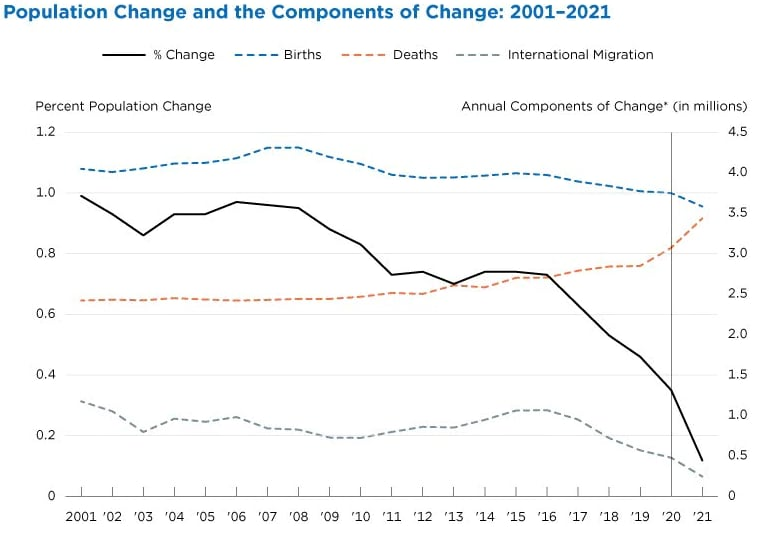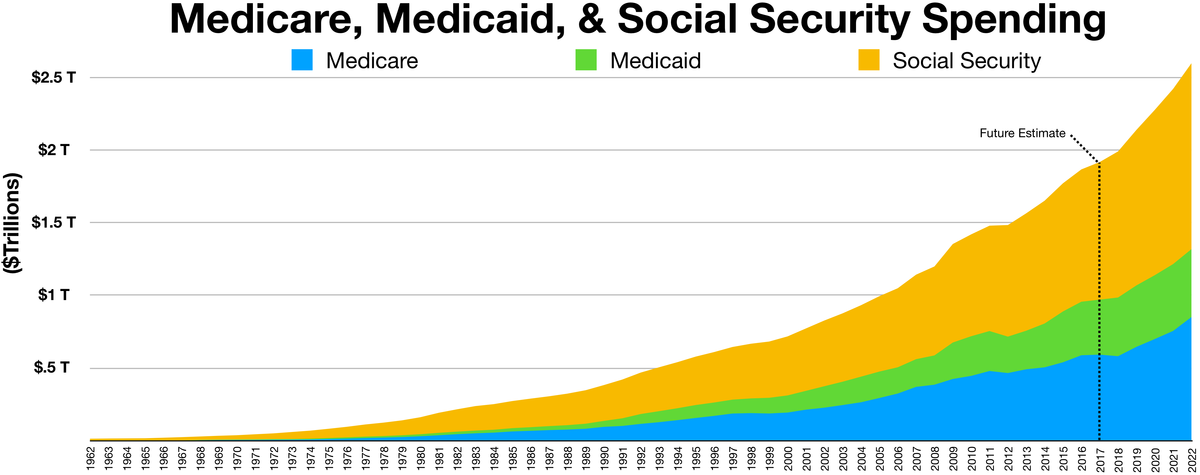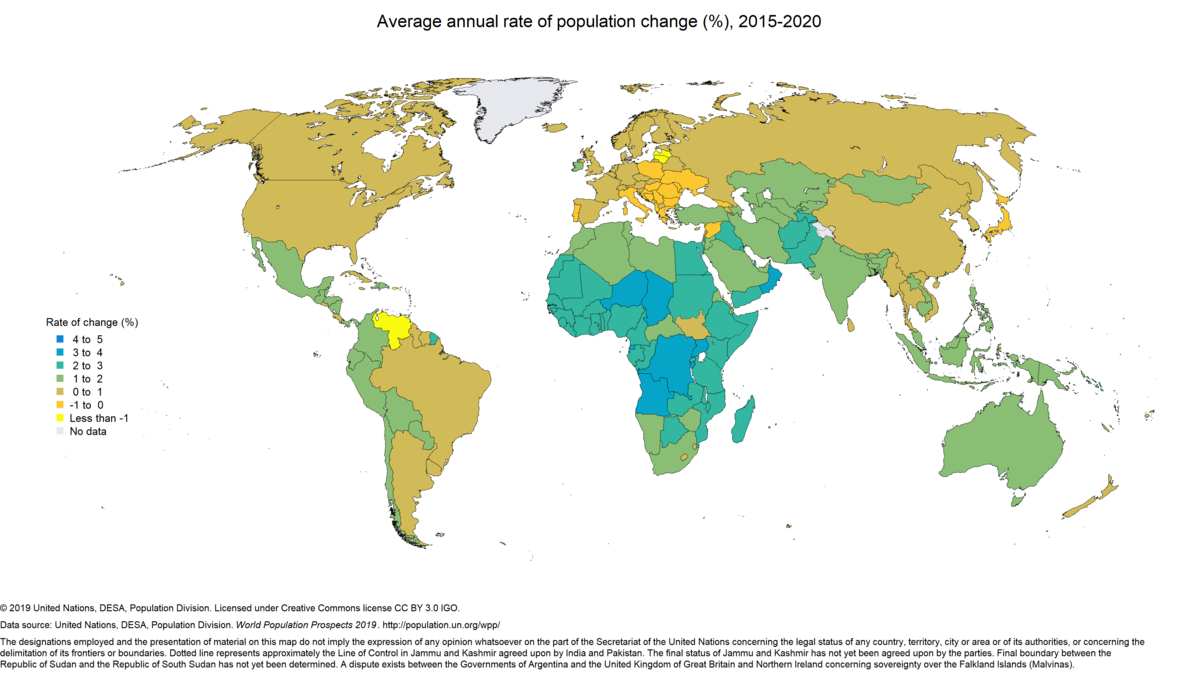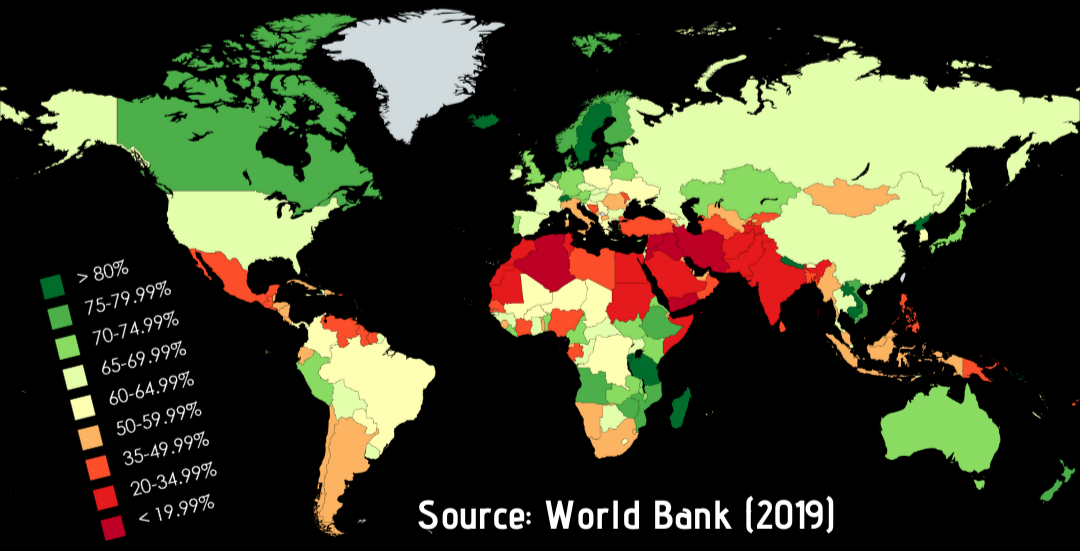 Graph from U. S. Census shows decline in births from 2001-2021.
Graph from U. S. Census shows decline in births from 2001-2021. 
The Trump Administration is floating the idea of giving a $5,000 baby bonus to
"every American mother after giving birth". This bonus is suggested as a response to a stark reality: despite a slight bump in the U.S. birth rate last year, the country still fails to produce enough babies to meet the 'replacement rate'. The replacement rate is 2.1 births per woman and the
U. S. rate for 2024 was 1.6. At these numbers, without significant immigration, the U.S. will find itself with an aging population and increasingly smaller numbers of young people. Who will work? Who will fund the government? Who will pay for the pensions of the elderly?
 Wikipedia user: Wikideas1.
Wikipedia user: Wikideas1. 
In the past, the U.S. has avoided the fate of
other nations that have declining birthrates. Immigrants made up the deficit in births. According to the
Migration Policy Institute, "immigration accounted for the entire growth of the total U.S. population between 2022 and 2023—the first time this has happened since census data collection on nativity began in 1850."
A variety of incentives have been suggested to induce women to have more children. The incentive mentioned above--a $5,000 baby bonus--may be one of the most ill conceived. 'American' women (that is, not women from South America, Mexico or Canada--only women from the U.S.) who have any financial resources at all are not likely to be persuaded by $5,000. There are strollers in the U.S. that
cost $5,000. The financial bounty is likely to be attractive to women who see their babies as profit centers. Women, for example, who
sell their babies Or, women who plan to be supported by the state. In New York, specifically, having more children means receiving more public assistance. While there is a time limit in some states on the number of years a person may collect public assistance, in New York there is
no limit. A woman can collect public assistance until the child reaches maturity.
It is true that the $5,000 would come in handy for 'unplanned' births. In that case the money would be less an incentive than a consolation prize.
Looking into the future, and across the planet, experts predict the low birth rate conundrum will be
exacerbated by cultural shifts in other parts of the world. These experts predict that increased access to birth control and education for women will extend the low birth rates to countries that currently have high levels of reproduction.
Not everyone thinks a low replacement rate is a bad thing. Stephanie Feldstein, for example, who is the population and sustainability director at the
Center for Biological Diversity, suggests that "A future with fewer people offers increased opportunity and a healthier environment." Ms. Feldstein is not alone in advancing this perspective.
At the 2018 World Economic Forum, the naturalist
David Attenborough addressed the issue of birth rate. He said that though he finds human babies the most fascinating creatures on earth, "the planet can’t sustain many more" babies. Another source that addresses the growth (or lack of growth) in population rate is Earth.org. An article from that website discusses the conclusions of a U.N. report on sustainability. The report's
assessment? "Not having children is in theory the most effective measure an individual in a high-income country can take to reduce their carbon footprint, more than 50 times more effective than eating a plant-based diet, recycling, or not using a dryer."
However, on the other side of this discussion, there is Elon Musk. He has repeatedly warned of the potential for
population collapse. As a matter of fact, Musk believes that the danger of population collapse is
greater than the danger from global warming--and this man believes that global warming
is a dire threat.  United Nations. Used under
United Nations. Used under 
Populations are not declining in every country. The 20 countries with the greatest population growth in the world are all
in Africa. It has been noted that as educational opportunities and availability of contraception increases in these countries, they will also experience a decrease in birth rate. This prediction leads me to an article I read from the
Heritage Foundation.. The foundation is a self-defined conservative think tank with a
goal of "Mobilizing Conservatives—uniting the conservative movement to work together."
Heritage takes the position that economic incentives alone are not going to significantly increase birth rates. The foundation asserts that people today have more money and are better able to support large families than they were at many times in the past. Yet, couples choose to have small families. What the United States needs is cultural reform, according to the foundation. Only that will increase the birth rate.
The article (2024) the foundation
published was entitled,
Education Policy Reforms Are Key Strategies for Increasing the Married Birth Rate. In a nutshell, it is suggested that the reason women are not having more babies is, they are simply too educated. The authors posit that educational subsidies (for higher education) should be eliminated.
People shouldn't be offered incentives for going to collage (according to Heritage). Those college years are the best child-bearing years. They are thrown away by the time a young person graduates. Forget about graduate school. There is little financial return (according to the authors) on graduate school investment for most people. And those extra years in school delay even more the possibility of having children.
The authors suggest that reforms should be extended to high school. Students should not be encouraged to take courses of study that prepare them for college. They should be placed in tracks of study that lead them to post-high school employment, or to marriage.
The authors further note that people who are devout (religious) tend to have larger families. The government therefore should subsidize religious education, most especially through tax breaks and vouchers. A woman schooled in religion, the authors believe, is a woman who will value child-rearing over career.
Child care subsidies should also be eliminated. These only encourage women to work.
Women in the Workforce, Globally World Bank. Used under
World Bank. Used under 
Going back to Donald Trump's $5,000 bonus idea: neither Heritage nor I believe that bonus would increase the U. S. birth rate. To be sure, the profound cultural shift the foundation suggests might actually work. To that end, I discovered a 2003
article on fertility rates. This piece was published in the National Academies Press. The article broke down the issue into four areas of consideration. The final area is the one I found most interesting and also most relevant to the ideas proposed by the Heritage Foundation. The article addresses what it terms 'biocultural inheritance'.
Fertility is not merely a matter of resource availability and physical fitness. It's not exclusively a reflection of material fitness. There has to be also cultural fitness. That is, "The view of human reproduction as rooted in biocultural inheritance casts new light on current human affairs. It implies that when the fabric of human social life and culture is repatterned or rent, fertility outcomes (in terms of effective fertility) are changed."
The cultural change envisioned by the Heritage Foundation would essentially reconfigure society. The social mobility ladder that education has traditionally provided would be removed. Lower income and lower middle class families would find their horizons profoundly limited. Their children would be directed into lower wage, lower skilled, lower opportunity futures, for it is the lower classes that benefit from loan subsidies and scholarships.
Class divisions would be entrenched as the wealthy gifted to their children the benefits of education.
Women overwhelmingly would be affected. They would be bound to the home, taking care of children. Tossed aside would be the advances in women's financial and physical autonomy of the last fifty years.
Conclusion
There is no conclusion. This is a discussion about a consequential issue. I leave to the reader to consider the future. More children? Less children? Whatever course is chosen, how do we get there?
I know where I stand. I'm not going back. There's no way I want my granddaughter to go back. I don't want to limit educational opportunities to future generations. Surely we can find a way to live in a world that has less people, that uses less resources. Surely we can find a way to share the resources we have more equitably--across the globe.







